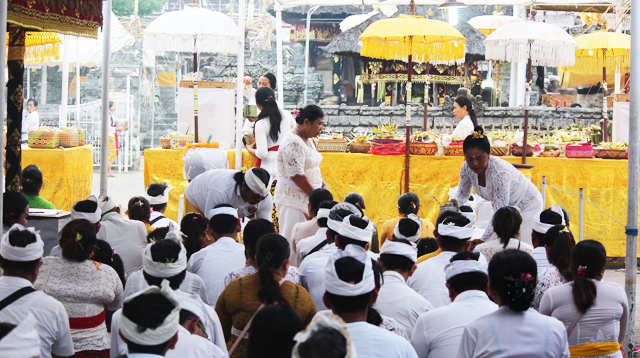THE Island of the Gods retains endless festivals and stories. Almost every day, the Hindu community carries out ritual activities. One of them is Sarasvati Day. This celebration is organized six-monthly (210 days).
As center for learning, public and Hindu schools establish the statue of Goddess Saraswati in the yard near the entrance gate. At all times, the figure of the lovely goddess will remind students of the graces and beauty of knowledge. Hopefully, their curiosity will be ever developing and inspiring them to learn more and more.
In essence, Sarasvati Day festival is held as an expression of gratitude to Goddess Sarasvati, for all the loves and precious life bestowed. In life, people want to create harmony with the three elements, namely the Creator, fellow humans and the environment. Balinese people name it Tri Hita Karana, meaning three causes of happiness.
The Sarasvati Day falls every Saniscara (Saturday) Umanis Watugunung. This celebration is aimed at the worship of Goddess Saraswati as the goddess of learning, wisdom, language, music and all arts. She also symbolizes to bestow unlimited creative energy and power in its various forms, including longing and love.
Judging from the order in the pawukon, Watugunung is in the sequence of the last wuku of the 30 wukus and the last day and it marks the beginning of the Balinese Pawukon calendar (one cycle is 30 x 7 = 210 days). This celebration has similarities with similar festival in India posing a celebration that marks the beginning of preparation for spring.
Prior to the Covid-19 pandemic in Bali, school students performed the Saraswati pooja at their respective school’s padmasana shrine. They thanked the goddess for the graces, the abundance of inspiration and the opportunity to learn in preparing themselves for facing the challenges in future life.
Individual Hindus also perform Sarasvati pooja at home and celebrate their important books and ancient texts (palm-leaf manuscripts) because they have provided valuable inspiration and knowledge.
The next day or Sunday morning, they celebrate Banyupinaruh Day. It is to purify one’s self through flower bathing in the sources of water or spring, such as lakes, rivers or beaches. People will flock to the location preceded with putting an offering. After that, they have a bath together and ask for purification.










